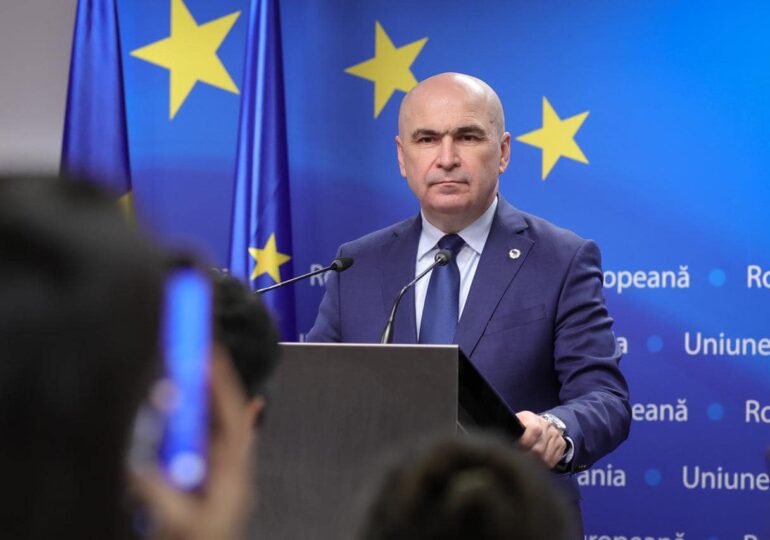Interim President Ilie Bolojan announced on Thursday, following the Paris Peace and Security Meeting, that a working group will be formed to monitor the 30-day ceasefire agreement in the Black Sea, in which Romania will participate. Additionally, our country continues to support Ukraine and strengthen the eastern flank, even though no Romanian military personnel will be sent to Ukraine.
On the other hand, some of the forces that will go to Ukraine will pass through Romania.
Ilie Bolojan outlined the main points discussed at the Peace and Security Meeting, convened to build a robust peace for Ukraine and Europe, attended by Ukraine, 31 states, and representatives of NATO and the European Union.
“The first of them was the ceasefire agreement in the Black Sea, the 30-day agreement. The countries present welcome the reaching of this agreement, but we note that Ukraine agreed for this agreement to be extended not only to navigation in the Black Sea, but also to land and air.
And unfortunately, such an agreement was not reached, and as seen when an irrefutable proof appears, Russia did not accept these conditions, and the theory that some want peace and others want war was refuted (confirmed, ed.) by what happened in these negotiations,” said Bolojan.
What role will Romania play in monitoring the ceasefire
He mentioned that regarding the monitoring part of the 30-day ceasefire reached, a working group will be formed to cooperate in monitoring the compliance with this agreement.
"In this regard, since the agreement refers to the Black Sea, a strategically important area for Romania because we have significant investments, because a good part of our exports are made in the naval area, because the port of Constanta is the most important port on the Black Sea, Romania will participate in this working group and through its infrastructure, radars, drones, air police, but also collaboration with Turkey and Bulgaria on demining, we will collaborate in such a way that this agreement is respected,” announced the president.
He pointed out that Romania has a strategic interest in continuing to support Ukraine because, without such support, there is a risk of the front collapsing and, practically, Ukrainians, by defending their citizens and territory, keep the danger at bay.
“Any situation in which Ukraine collapses would mean significant complications and an advance towards the western area, which neither Europe nor Romania desires. In this respect, the aid established at the Council last week will continue to be provided, and collaboration for strengthening the Eastern Flank will be ensured,” Bolojan stated.
Bolojan confirms: No Romanian military in Ukraine, but we will be a transit country
At the same time, Ilie Bolojan confirmed that Romania will not send any military personnel to Ukraine.
“From this point of view, as I have said before, Romania will not send, and has clearly announced this issue, any Romanian military to Ukraine. However, in a hypothetical situation where a peace agreement is reached, there has been discussion about the possibility of a plan, an analysis, regarding the forces that could provide such a guarantee.
These forces would not under any circumstances reach the front line, they could be located either on the Eastern Flank or at a significant distance from the front on Ukrainian territory. And anyway, the transit of these forces can only be done through Romania, at least those in the southern area,” Bolojan mentioned.
He emphasized that, from this perspective, "we will participate as a transit country, as a hub, in these discussions, so that the General Staff knows what these plans could be, because if such a hypothesis arises, we can be prepared with the logistical infrastructure.”
Expect a wave of speculation before elections
Bolojan stated that the decision not to send Romanian troops to Ukraine was made after consultations with political parties.
“Our decision not to send troops to Ukraine was made after consultations with political parties because when you engage the country in a very important issue, I believe it is responsible to ensure that those on whom the decision depends, in this case the Romanian Parliament, have a clear position.
Therefore, there is no support for such a situation. Hence, things are clear here, and there is no need to further explain them,” said the interim president in Paris.
He specified that, “being an electoral context, in the next month, until the presidential elections, all kinds of things that can be speculated on, to create fears, to create voting motivation, in one way or another, will be used.”
“It is a form of disinformation that I believe those who are running for office especially, but also those involved in campaigns, if they truly care about our country, as they declare, should be very cautious about using,” added the interim president.
“From this perspective, we have communicated the decision of our country and we have not had any issues with any country, including France. So we have had no comments on this issue because each country knows what the possibilities are, what its national interests are, and this is the conclusion we have announced, a matter of consistency that, if you follow all the statements, you will see are after meetings with political parties because such issues are not decided by one person, you simply have to think very carefully and have support for such a decision,” Bolojan pointed out.

